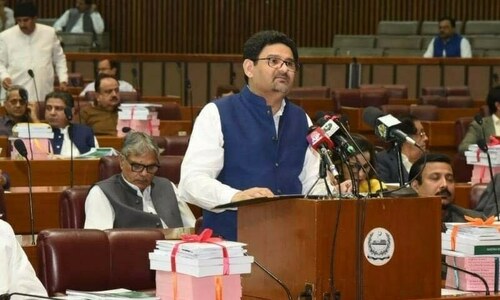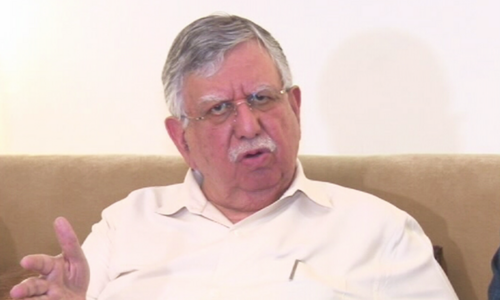ISLAMABAD: Conceding for the first time that mismanagement of contracts in its previous tenure was a major source of current energy sector challenges, the PML-N-led government has identified domestic political uncertainty, Russia-Ukraine war, higher provincial deficits and significant losses and debts of state-owned enterprises (SOEs) as key risks to next year’s budget and medium-term macroeconomic outlook.
In an integrity statement to parliament required under the Public Finance Act as part of the federal budget, Finance Minister Miftah Ismail and Secretary Finance Hamed Yaqoob Sheikh have also highlighted a possible increase in expenditures because of higher subsidies and interest payments and an anticipated setback to revenue collection owing to import and demand contraction, posing substantial risks to the economic growth and sustainability of fiscal and monetary projections.
“The main reasons behind the power sector losses include high cost of generation, attributable to costlier technologies and poorly designed contracts, resulting in exorbitant profits for private investors and front-loading of debt repayments during the first ten years of plant operations, above-average transmission and distribution losses and below-average recoveries of electricity bills,” the joint statement issued by the finance ministry said. As a result, the power sector is the largest recipient of government subsidies at present, it added.
The statement said several fiscal risks confronted Pakistan and a lot of effort was needed to overcome or mitigate the potential adverse effects of such risks.
Higher provincial deficits, significant losses and debts of SOEs may also lead to budget slippages, finance ministry says
“The silver lining is that the country has already made considerable progress in certain areas and a number of strategies are available to address the risks that remain,” the statement said. It promised the risk management strategy under the Public Financial Management (PFM) reforms to bring discipline, transparency and credibility at all stages of the budget cycle to prevent or lower exposure to such risks and create buffers to counter.
Fuel imports — those of oil, gas and coal — constituted a large portion of Pakistan’s import bill and their prices affected the prices of various goods and services as they fed into the costs of production through multiple channels, including transportation costs, energy costs, etc., the statement said. “Volatility in prices of these fuels is a major reason behind the volatility in inflation rates which, in turn, contribute to volatility in interest rates and exchange rates.”
Moreover, an increase in the cost of imported fuels — whether due to rising global prices or a falling rupee, or both — could affect the wider economy in the form of lower GDP and revenue growth besides higher current account deficit, inflation, interest rate, the interest cost, fiscal deficit and public debt.
“Currently, there are little or no fiscal buffers or risk management framework for dealing with adverse shocks in the prices of imported fuels,” the statement said.
Likewise, the statement pointed out that “strict fiscal discipline” on the part of provinces and, resultantly, their cash surplus was a crucial component in reducing the country’s overall consolidated fiscal deficit.
“In the absence of legally binding commitments from provinces, the risk remains high that the projected provincial budget surpluses (Rs800bn for the next year) may not materialise,” it said, adding that this risk was “particularly elevated considering that any shortfalls in [Federal Board of Revenue’s] projected collections may provide the provinces with the justification not to meet the budget surplus targets”.
The ministry also highlighted that the number and aggregate size of SOEs had grown considerably over time. Losses and excessive debt of SOEs have necessitated costly government bailouts in the form of subsidies, grants, loans and guarantees. “The fiscal cost of running the loss-making SOEs has been quite high and has worsened an already fragile financial position of the government”, whose policy to keep them has aggravated the fiscal situation.
Also, the conflict between Russia and Ukraine has been identified as a significant risk factor to Pakistan’s positive economic outlook as the prolonged conflict could further raise international oil and food prices and impede world trade through additional supply disruptions affecting our imports, exports and taxes on imports and put additional inflationary pressures. Furthermore, higher international commodity prices could strain Pakistan’s fiscal account and subsidies to protect citizens significantly increase the risk of fiscal slippages.
The statement said the domestic political uncertainty could result in macroeconomic imbalances and monetary tightening and fiscal consolidation measures to reduce the demand pressures would slow down economic growth in the coming year. On top of that, the exchange rate depreciation has an immediate impact and can be especially severe when a large portion of the debt is in foreign currency.
The finance ministry said Pakistan’s fiscal stance was vulnerable to commodity prices, especially those of oil, and a fluctuation impacts revenues on account of the petroleum development levy and on the expenditure side through fuel subsidies. “As a result, it causes severe macroeconomic imbalances. To deal with such circumstances, fiscal buffers become increasingly important,” it said.
Published in Dawn, June 13th, 2022













































